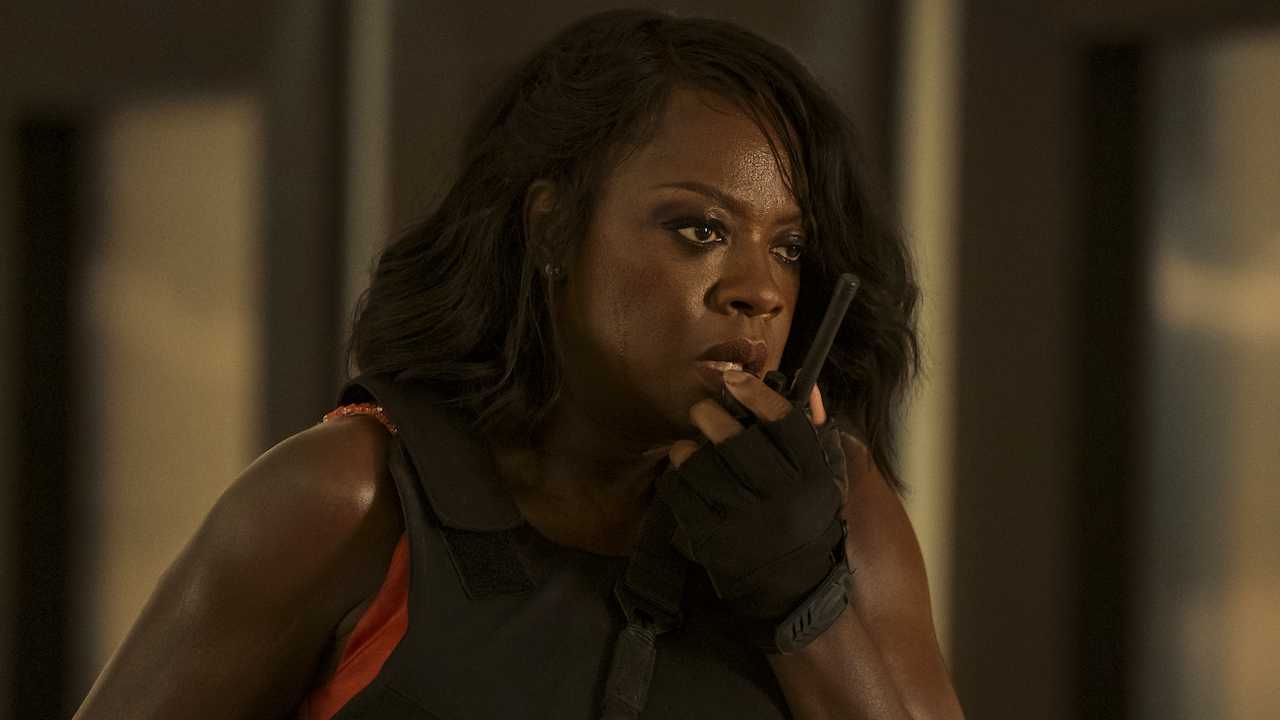Part of the reason why fiction is such a remarkable thing is because there are no rules. New worlds can be invented– but even stories set in places that we recognize from our daily lives featuring familiar, “normal” characters have the capacity to ignore the bounds of reality. Ideas that seem utterly preposterous can be taken at face value and possess unimpeachable verisimilitude. Tell a person that there are monstrous lizard people taking over the government, they’ll laugh in your face, but that’s wholly acceptable as the plot of a best-selling novel.
With Knock At The Cabin, writer/director M. Night Shyamalan wages a frustrating war with this fact. Based on the novel The Cabin At The End Of The World by author Paul Tremblay, the setup possesses innate tension – a home invasion with potential apocalyptic stakes – and there are interesting personalities and character dynamics in play, but it struggles persistently with efforts to throw cold water on its most outrageous ideas. It assumes a strange lack of imagination in the minds of its audience, and that fatal flaw prevents it from ever getting anywhere near a satisfying conclusion to the story.

Release Date: February 3, 2023
Directed By: M. Night Shyamalan
Written By: Steve Desmond & Michael Sherman and M. Night Shyamalan
Starring: Jonathan Groff, Ben Aldridge, Dave Bautista, Nikki Amuka-Bird, Abby Quinn, Kristen Cui, and Rupert Grint
Originally scripted by Steve Desmond and Michael Sherman before being rewritten by Shyamalan when he came aboard to direct, Knock At The Cabin is set deep in a Pennsylvania forest where Eric (Jonathan Groff) and Andrew (Ben Aldridge) are vacationing with their eight-year-old daughter Wen (Kristen Cui). While Wen is out catching grasshoppers one day, she is approached by a seemingly genial man named Leonard (Dave Bautista) who makes efforts to befriend her. This goes well at first, but the girl gets understandably freaked out when Leonard is joined by three friends – Sabrina (Nikki Amuka-Bird), Adriane (Abby Quinn), and Redmond (Rupert Grint) – all of whom are wielding custom-built, dangerous-looking weapons.
Wen runs into the cabin to warn her fathers, and efforts are made to barricade doors and windows, but they are in vain, and Eric and Andrew are restrained (with Eric getting a concussion in the process). The invaders clarify that they don’t want to be doing what they are doing, and that it is not their intention to harm anyone, but they are acting in an effort to save the world from the apocalypse. With great empathy, Leonard explains that the only way to stop the impending death of humanity is for one member of the family to be willingly sacrificed.
Knock At The Cabin delivers thrills, but it can’t sustain energy because of a flawed perspective.
Put in the same situation as Eric, Andrew, and Wen, any one of us would probably act the same way that the characters do, which is to think that the home invaders are mentally unwell and suffering from some kind of collective delusion. In this regard, Knock At The Cabin could certainly be called realistic, but this established perspective also ends up being flawed because it’s part of a movie made by an established genre director with a well know penchant for creating twists. This is a horror film, so the idea that Leonard & Co. are right and that a biblical apocalypse could really be on the table is naturally in the mind of the audience – but that’s not really a respected viewpoint in the story, resulting in a pattern of something terrible happening and then Andrew attempting to justify it in rational terms.
Regardless of the antagonists’ true motives or whether or not the pending end times are real in the movie, there is tension that is maintained early on due to the fact that there is always a danger present. After all, the potential death of an innocent person is at the heart of the plot, and the zealotry of Leonard and his companions basically oscillates between unnerving and extreme. It does, however, wear thinner and thinner as the film continues, mostly because the plot doesn’t really evolve.
The whole cast in Knock At The Cabin is great, but Dave Bautista is particularly impressive.
Knock At The Cabin’s script has problems narratively, but its greatest strength is its characters, and that aspect is bolstered by excellent performances delivered by the entire cast. Jonathan Groff and Ben Aldridge and have tremendous chemistry together, with flashback sequences showcasing a wonderful relationship between Eric and Andrew, and they have strong, contrasting energies. Nikki Amuka-Bird, Abby Quinn, and Rupert Grint are all terrific as well, particularly in the way in which they get across the internal conflict that they are processing. They express themselves as deeply human and have real empathy for what they are putting the family through, which is particularly striking when the conflict between the hostage takers and the hostages is at full boil.
Truly, though, the film is a showcase for the talent of Dave Bautista, who delivers one of his best performances to date as Leonard. It’s a turn where the character’s heart is more substantial than the actor’s imposing stature, and while he is the principal antagonist, Bautista’s work can’t help but make you connect with him (which actually only further emphasizes the imbalances in the script). Leonard isn’t a trope gentle giant either; he is a complicated and good man who believes that has been burdened with a terrible mission to save humanity. Bautista is at his best since his supporting role in Blade Runner 2049, and it only encourages one to be more excited for his post-Marvel, more drama-centric career.
There is a good amount to appreciate in Knock At The Cabin, but it’s really just enough for the film to hit the bar of “disappointing” instead of “bad.” One always goes into the latest M. Night Shyamalan film hoping that it will be his next The Sixth Sense, Unbreakable, or Split, but this is more on the level of Glass and Old. If you still have questions about the latest from M. Night Shyamalan, be sure to check out our Knock at the Cabin ending explained guide.

Eric Eisenberg is the Assistant Managing Editor at CinemaBlend. After graduating Boston University and earning a bachelor’s degree in journalism, he took a part-time job as a staff writer for CinemaBlend, and after six months was offered the opportunity to move to Los Angeles and take on a newly created West Coast Editor position. Over a decade later, he's continuing to advance his interests and expertise. In addition to conducting filmmaker interviews and contributing to the news and feature content of the site, Eric also oversees the Movie Reviews section, writes the the weekend box office report (published Sundays), and is the site's resident Stephen King expert. He has two King-related columns.











